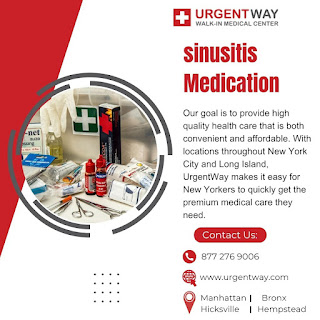How do corticosteroids work as a sinusitis medication?
How do corticosteroids work as a sinusitis medication?
Introduction:Millions of
individuals worldwide suffer from the common ailment known as sinusitis. Inflammation
of the tissues lining the sinuses causes symptoms like headaches, facial
pressure, nasal congestion, and trouble breathing. One of the best drugs for
sinusitis is corticosteroids, especially if inflammation rather than infection
is the source of the illness.
Corticosteroids:
What Are They?
Synthetic medications called corticosteroids are made to resemble the hormone
cortisol, which is produced by the adrenal glands naturally. The body's
metabolism, immunological response, and inflammation are all significantly
influenced by cortisol. There are several types of corticosteroids, including:
·
Sprays for the nose (for localized use)
·
Tablets used orally (for systemic therapy)
·
(For severe instances) Injections
·
Corticosteroids mainly target inflammation in
the sinus and nasal tissues when taken as a sinusitis medicine.
What Makes
Inflammation in Sinusitis Important?
The body's natural reaction to allergies, illnesses, or irritants is
inflammation. When sinusitis strikes, the sinus linings become inflamed, which
results in:
·
swelling that obstructs the nose
·
Overproduction of mucus, which causes
congestion
·
Pain and pressure in the head and face
·
Corticosteroids are useful in reducing
inflammation, which is essential for easing the symptoms of sinusitis.
Corticosteroids:
How Do They Work?
Corticosteroids aid in sinusitis management by:
Cutting Down on Inflammation
The inflammatory immune response is suppressed by corticosteroids. They lessen
swelling in the sinuses and nasal passages by preventing the release of
inflammatory substances including prostaglandins and histamines.
Increasing Airflow
Corticosteroids help open up the nasal passages, which facilitates breathing by
reducing swelling and inflammation.
Reduced Production of Mucus
Excess mucus is frequently produced by inflamed sinuses. By lowering mucus
production, corticosteroids assist to minimize post-nasal drip and nasal
congestion.
How to Avoid Recurrence
By sustaining decreased inflammation over time, corticosteroids can help
prevent recurring flare-ups in chronic sinusitis.
Corticosteroid
Types for Sinusitis
Sprays of Nasal Corticosteroids
For sinusitis, these are the corticosteroids that are most frequently
administered. Popular choices include of:
·
(Flonase) Fluticasone
·
Rhinocort, or Budesonide
·
Nasonex, or mometasone
Benefits
·
targets the root cause of inflammation
·
Low adverse effects because of confied use
·
Corticosteroids used orally
·
Prednisone is one of the oral corticosteroids
used to treat severe or chronic sinusitis.
Benefits
·
reduces extensive inflammation systemically.
·
beneficial for ailments including severe allergic
responses or nasal polyps
·
Be advised that using oral corticosteroids for
an extended period of time increases the chance of adverse effects, such as
weight gain, sleeplessness, and weaker bones.
A
Corticosteroid Injectable
In severe situations, injectable corticosteroids may be used to provide potent
and rapid relief.
Benefits
Quick response to extreme inflammation
used frequently when alternative therapies don't work
Situations in
Which Corticosteroids Are Most Effective
Nasal polyps associated with persistent sinusitis
nose polyps, which are benign growths in the nose canal that cause sinus
obstruction, are reduced with corticosteroids.
Sinusitis due to allergies
By controlling sinus inflammation brought on by allergies, corticosteroids
lessen the need for decongestants or antihistamines.
Recovery After Sinus Surgery
Corticosteroids facilitate appropriate recovery following sinus surgery by
reducing swelling and preventing the formation of scar tissue.
How to Safely Use
Corticosteroids
Observe the recommended dosage
To reduce adverse effects and increase effectiveness, always take
corticosteroids as prescribed by your doctor.
Don't Overuse
Side effects from long-term or excessive usage of corticosteroids, particularly
oral formulations, include:
·
Reduced immunological reaction
·
Osteoporosis
·
Unbalanced hormones
·
Wash your nasal passages. Initially
·
Before using a nasal corticosteroid spray,
saline irrigation can help to enhance absorption and remove mucus.
·
Keep an eye on any side effects.
·
Nasal corticosteroids frequently cause the
following adverse effects:
inflammation or dryness in the nasal passages
·
Bleeding noses
·
Consult your physician if side symptoms
continue.
Corticosteroids
and Other Sinusitis Drugs: A Comparison
Decongestants
Decongestants narrow blood vessels to produce short-term relief, but unlike
corticosteroids, they don't treat the underlying inflammation.
Antibiotics
Only bacterial sinus infections can be treated with antibiotics. Conversely,
corticosteroids target inflammation and are effective for both bacterial and
non-bacterial causes.
Antihistamines
While antihistamines work well for sinusitis caused by allergies, they might
not be as successful at treating severe inflammation as corticosteroids.
Who Must Steer
Clear of Corticosteroids?
People who have the following conditions may not benefit from corticosteroids:
Diabetes that is not under control (because they can boost blood sugar levels)
Cataracts or glaucoma (because they might raise eye pressure)
persistent infections, as they weaken the immune system
Before beginning corticosteroid treatment, always talk to your doctor about
your medical history.
Advantages of
Corticosteroids for Immediate Sinusitis Symptom Reduction
Within days, corticosteroids show a discernible reduction in inflammation.
Minimal Effect on the System (for Nasal Sprays)
Nasal sprays reduce the possibility of systemic negative effects by concentrating
on targeted treatment.
Enhanced Life Quality
Corticosteroids can greatly enhance your everyday comfort and sleep quality by
lowering symptoms like face pressure and nasal congestion.
Sinus Infection doctor At UrgentWa
y Walk-In Clinic:
Sinusinfection treatment is available at all UrgentWay locations. We are open seven
days a week from morning to evening, giving you the freedom to visit us
whenever it is convenient.
Conclusion:
By focusing on inflammation, which is the underlying cause of many sinusitis
symptoms, corticosteroids are a potent and successful treatment. These drugs
can reduce congestion, discomfort, and edema and enhance general quality of
life whether they are administered as nasal sprays, oral pills, or injections. Corticosteroids
are a safe and effective way to treat sinusitis, particularly in severe or
chronic instances, when used as directed by a doctor. They can help you breathe
easier and live more comfortably when paired with lifestyle changes and
appropriate care.



Comments
Post a Comment